The Hitchhikers’ Guide to the Gobi: Three-wheeling Through the Desert
"It's not an easy task to breathlessly commandeer a truck in the Gobi and claim a space in it for three foreigners plus a three-wheeler."
“We want to hire your tricycle.” The driver looked bemused for a fleeting moment before he began to envisage a day off work and a hefty sum of money. This readiness to make a quick buck can often be an annoyance in China, but ever-so-occasionally it represents a golden opportunity for both parties. For once the yuan signs in his eyes were eclipsed in intensity by the images of Gobi tricycling in mine.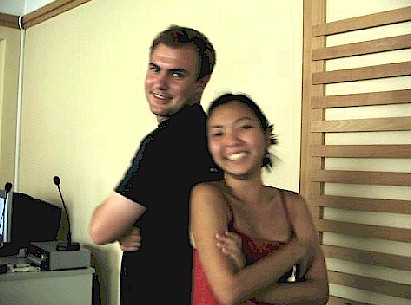
“Can you ride it?” he asked, and I completed a little test run. It was perfectly unsuited to the task in hand. I looked at Yin – my Singaporean partner in crime – with raised eyebrows and she realised I wasn’t simply messing about. We agreed on a price, handed over a hefty deposit and arranged to meet him in the evening. He disbelievingly wandered off to enjoy an unexpectedly free and profitable day.
On Cornering & Coke Consumption
Trishaw duly procured, our next task was to pick up our resident Icelander. To do so necessitated navigating the town, and it was while cruising the streets that I realised that our trike handled like a rhinoceros. Survival manuals advise that if you are pursued by one of these unwieldy animals, you can be pretty certain of escape if you run in zigzags: rhinos can’t cope with corners. Furthermore, the braking distance of our unwieldy beast was akin to that of an aircraft carrier. The brakes themselves were not operated by the conventional levers on the handlebars but instead by a cable inconveniently located below the main frame of the trike. And when applied, it didn’t have much effect. These hardy machines were designed to build up inertia and bulldoze their way through traffic.
We conducted a little off-road test shortly before the pick-up point. As we mounted the pavement and steered through some rough ground I lost control of the vehicle and we clattered back down off the kerb and ended up perpendicular to the direction in which I thought we had been pointing. Luckily there was no oncoming traffic, and we conjectured that there would be less traffic and fewer corners in the Gobi to contend with, though there would be plenty of bad road to upend us. The learning curve would be steep. (As would the road, we later discovered.) We went shopping for supplies as we waited for Siggi and made sure to buy plenty of water and some fruit. The passenger seat was detachable and doubled up as the entrance to a storage space, and thus we stowed our food and drink there. The sun was beating down relentlessly, but fortunately our machine came complete with a canopy to shade us from the inferno.
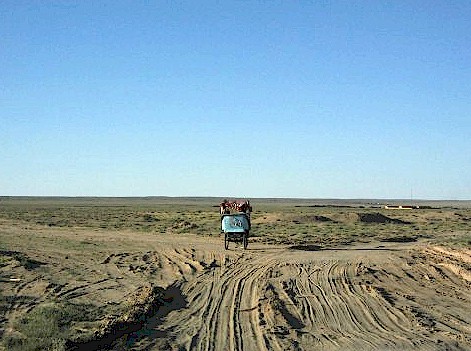
Siggi was suitably impressed and was quickly enlisted as the third and final member of our trio of tricyclists. He was studying social anthropology at Cambridge and the programme included a placement at Inner Mongolia University, which is where we had met. Ostensibly he had come to the Gobi to do some research for his thesis. In reality he spent most of his time drinking coke, which may or may not have been due to his nationality. Iceland apparently has the highest per capita consumption of Coca Cola in the world, and whether Siggi was simply sticking to the national norm or whether he was single-handedly upping the average to record-setting levels, it was impossible to tell.
To those who scoff at the second hypothesis, think of the effect that amputees have on our average number of limbs. It would only take a couple of limb-deficient specimens in our population to bring the average down to 3.9999, thus generating the unusual situation whereby the majority of people are above average. Could the Siggmeister be as instrumental in catapulting Iceland past the likes of Liechtenstein, San Marino and those other great nations vying for Coke Consumption supremacy as a Cambodian quadruped would be in leapfrogging Azerbaijan and Vietnam in a League of Least Limbs? I would have posed the question to him but he was immorally gulping down a Pepsi.
Yin had been at Cambridge too, and had been signed up for the same summer camp that I was supposed to be running in southern China. When that had fallen through, we were extremely fortunate that a Plan G (for Gobi) had fallen into our laps. I unexpectedly had the opportunity to be part of a pioneering English programme at this Inner Mongolian outpost, and was somehow able to convince Yin to join me. She must have regretted that decision ever since – I had rather dyslexically given her a non-existent hotel name as our meet-point, but she had remarkably managed to turn up at the correct place with three hours to spare. Thus we had diametrically opposed first impressions of each other: while I admired her hardiness and resiliency she had me labelled as a Chump.
Fossil-hunters, Missionaries & Spies
All three of us had the luxury of a free day and what better way to spend it than scouting out a salt lake in the desert? Before I tell you what became of us I would like to recount a tale or two from some of our desert-bound predecessors. Seventy years ago a group of well-educated westerners had made a similar sortie to the salt lake, albeit it using different methods of propulsion and with an actual aim rather than our deliberately ambiguous mission statement of ‘let’s cycle to the lake and see what happens’. The crew of yesteryear had been headed by a chap called Roy Chapman Andrews, an adventurer extraordinaire and the man whom some would erroneously claim to have been the model on which Indiana Jones was based.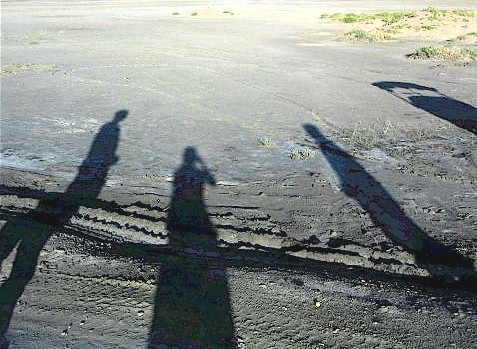
He drove across the desert in the stately saloons of the 30’s and in the camel caravans of time immemorial. There are some absolutely amazing shots of his expedition awaiting anyone who seeks out his epic expedition write-up: New Conquest of Central Asia. The pictures are in separate plates and many fold out to become five times the width of a normal page and constitute stunning panoramic shots.
By all accounts (including his own, if one reads between the lines) he was an incurable exaggerator, so one has to take his survival stories with a pinch of salt. And speaking of salinity, on his way from Peking to Urga (as Ulaanbaatar, the Mongolian capital, was then known) he had passed through these very parts and made some history right by the salt lake to which we were heading:
We were hardly settled before the last two cars swung around a brown earth bank and roared into camp. The men were obviously excited when I went out to meet them. I knew that something unusual had happened because no one said a word. Granger’s eyes were shining and he was puffing violently at his pipe. Silently he dug into his pockets and produced a handful of bone fragments; out of his shirt came a rhinoceros tooth, and the various folds of his upper garments yielded other fossils. Berkey and Morris were loaded in a similar manner. Granger held out his hand: “Well, Roy, we’ve done it. The stuff is here,” he said. We were very happy. It was the first definite evidence that our exploration in Mongolia, so far as the fossils were concerned, would not be the fruitless hunt predicted by our friends in Peking.1
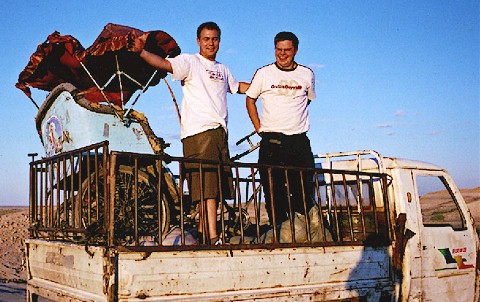 A few years later and the stage was set for Francesca French and Mildred Cable, two Irish missionaries who heard God’s calling and set about spreading the gospel to the good folk of the Gobi. I haven’t yet got my hands on their writing – which includes such classics as The Gobi Desert (MC & FF), Why not for the World?: The Story of the work of God through the Bible Society (MC), Luckchild: The Boy and the Man (FF), Journey with a Purpose (MC), Wall of Spears: the Gobi Desert (MC) and my personal favourite, os (FF) – but one assumes that the type of places they stayed in made a Bethlehem stable look like the Ritz.
A few years later and the stage was set for Francesca French and Mildred Cable, two Irish missionaries who heard God’s calling and set about spreading the gospel to the good folk of the Gobi. I haven’t yet got my hands on their writing – which includes such classics as The Gobi Desert (MC & FF), Why not for the World?: The Story of the work of God through the Bible Society (MC), Luckchild: The Boy and the Man (FF), Journey with a Purpose (MC), Wall of Spears: the Gobi Desert (MC) and my personal favourite, os (FF) – but one assumes that the type of places they stayed in made a Bethlehem stable look like the Ritz.
MC’s name is a bit of a mystery, as I would have thought that surnames predated cables. At an American summer camp I once taught a kid called Marc Mechanic and was even more baffled as to how such a modern profession found its way onto his birth certificate. In his case, the solution may well lie in the fact that he was Jewish, and so his ancestors may have had to undergo a name change during the years of persecution – a time in which motor cars had burst onto the scene and were in need of folk to repair them. As for the Cable case, my only offering is that she got together with Gertrude Wireless and founded a nice little communications company.
Decades after this pair had returned to Europe and been immortalised in biographies written by chaps and chapesses trading by the names of Cecil, William, Eva and Phyllis, Britain established diplomatic relations in Mongolia. One of the first people they sent out there was a Slovenian-speaking Ambassador called John Colvin whose previous posting had been in North Vietnam. He certainly specialised in manning out-of-the-way embassies. Years later he wrote up his memoirs and – although very bigoted in places – he has more than a tale or two to tell. I shall leave you with the following excerpt, which is particularly pertinent to the border between the two Mongolias and indicative of the eccentric cast of characters that His Excellency came into contact with: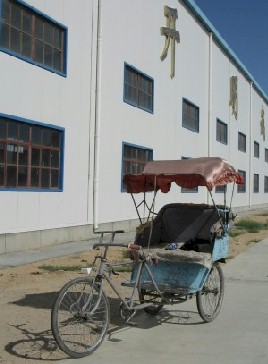
The Japanese, after negotiation over war damage, re-established diplomatic relations half-way through our tour. Their first charge d’affaires, never wholly sober, was a Mongol speaker. At one of Ulan Bator’s frightful receptions, he addressed a Mongol Minister:
‘You have an Inner Mongol accent,’ said the latter. (Inner Mongolia is in China, not in the Mongolian People’s Republic.)
‘Yes, I was based there in 1943.’
‘In what capacity?’
‘A monk at a Yellow Faith Lamasery, cover for espionage on behalf of the Japanese forces against your country. I was caught just across the frontier by an Outer Mongol military patrol. The soldiers did not kill or seize me because, knowing your customs, I instantly removed the saddle from my horse, and lifted it in the gesture of surrender.’
‘And then?’ harshly enquired the Minister.
‘The patrol let me go, thinking that I would die in the desert. They took the horse, naturally. But they did not know that, behind a sand dune, I had another horse.’
‘What!’ said the Minister. ‘We’ve been looking for you for 30 years.’2
Ah, the mysteries that lie within the Gobi sands. With all these tales of dashing bravado, we had a tough act to follow on our humble tricycle.
No-man’s-land
As we exited the town tarmac gave way to concrete then sand. Our route took us past hangar-like sheds which housed the hydraulic machinery used to lift international trains clean off the rails so that their bogies (wheels) could be replaced. This was because Mongolian railways used the wider Soviet gauge whereas Chinese tracks were standard size. Yin and I had been inside before and befriended some of the workers, marvelled at the graveyards of rusting wheels and clambered over some Yukos tankers carrying Siberian oil. Siggi was now treated to a little look of this bizarre border town industry. We also got a nice respite from the sun, and it took my eyes a little while to adjust back to the glare of the Gobi.
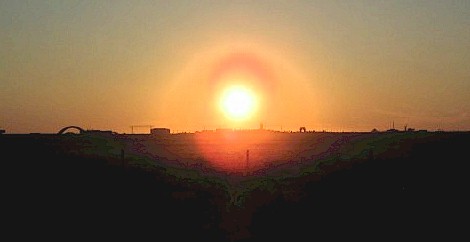 As we hauled our tricycle across the railway line we were only a couple of kilometres from the border and could see the watchtower which stood beside the rail crossing. How far the security extended east and west across the Gobi wastelands remained an unanswered question. The British adventurer Benedict Allen had come face to face with a fence at
As we hauled our tricycle across the railway line we were only a couple of kilometres from the border and could see the watchtower which stood beside the rail crossing. How far the security extended east and west across the Gobi wastelands remained an unanswered question. The British adventurer Benedict Allen had come face to face with a fence at
Zamiin-Uud, the Mongolian town opposite where we were now, after a monumental camel trek across the desert. He reports thus:
‘I came before too long to a fence. One of the few I had seen in all my five months travelling, it had been broken down, trampled by livestock. As I followed it along towards the town, the official border crossing point, it became more serious. It was joined by a second fence. Then electrical wiring. Behind it all, on the Chinese side, the ground had been freshly harrowed to show up any human footprints. Nice idea but all these devices – the first fence, the second fence, the electric wiring – were lying broken, twisted, abused. The culprits – cows – sat around dopily between the fences and others were infiltrating beyond. Like true Mongolians, these cow nomads would not be stopped by that territorial, divisive thing of us foreign people, us settled people: the fence.’3
Inner Mongolia is much more densely populated than Mongolia proper, but is still pretty Mongolian in many senses – even the tracks looked somewhat nomadic and whimsical in these parts and we were not sure which would carry us to the lake. We certainly didn’t want to stray too close to the border, though animals grazing in no-man’s-land would have been an interesting spectacle. We asked directions of an old Mongolian woman who pointed us on our way, adding that we wouldn’t be able to swim when we got there. The going was tough because the track was not totally firm – the intermittent trucks we saw plying these desert highways always created clouds of dust. We alternated between cycling and pushing, and rotated drivers almost as frequently as pedals. The lake was signposted as being only 12km out of town, so however slow our progress became we were confident that we could get there. As for getting back?we would cross that bridge when we came to it.
Downhilling I
As we stopped for a well-earned rest a truck rumbled up to us and the driver offered us a lift. He said the road was dangerous after this point and that we couldn’t possibly continue. “The hill is too steep,” he explained. However, during my cycling exploits in China I had consistently been told that it was too far, too hot, the roads were too bad, that it was not possible to do. I prided myself in proving them wrong, and we dismissed both his offer of a ride and his warning of danger.
In front of us the track sloped downwards but not at a frightening angle – 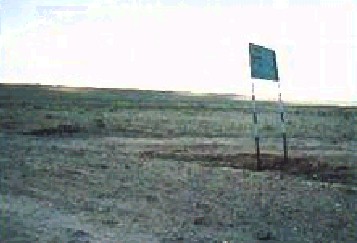 it looked reasonably tame in fact. We thought we could spy the lake not too far from the bottom, though it looked like it might be completely dry. We decided to go for it, and almost came to regret this decision. Had we been on standard bikes, maintaining control and keeping our speed in check would have been easy, but our tricycle was meant for going rather than stopping and built up pace as it thundered down the slope. The track was rutted and uneven which exacerbated our problems.
it looked reasonably tame in fact. We thought we could spy the lake not too far from the bottom, though it looked like it might be completely dry. We decided to go for it, and almost came to regret this decision. Had we been on standard bikes, maintaining control and keeping our speed in check would have been easy, but our tricycle was meant for going rather than stopping and built up pace as it thundered down the slope. The track was rutted and uneven which exacerbated our problems.
The two in the back were experiencing a real rollercoaster ride. Up front, I was supposedly in control of the machine. I tried to keep it pointing straight, because any major deviation in direction at such speeds would have caused it to tip. And if it did tip, our bones would have been as broken as those of the dinosaurs that Roy Chapman Andrews had discovered out here. Which would have meant we’d have been patched up by a dodgy Mongolian doctor or – heaven forbid – a bonesetter. This latter practitioner of Mongolian medicine receives no formal training but is born with the skill to remould bones. Traditionally, after a fall from a horse and with a broken set of bones, the unfortunate rider would be seen by the bonesetter, who would run his hands over the fractures, re-breaking and resetting to fix up the hardy horseman.
The brake was useless so I ploughed the earth with my feet while holding on for dear life. We lurched wildly to the left and then to the right as I overcorrected. The potential for pear-shapedness was off the charts. This was a case of chaos theory in action or, as the scientist would put it, sensitive dependence on initial conditions. An extra grain of sand in the wrong place could have transformed a backside-bruising bump into a bone-crunching death trap. Fortunately the sand had aligned itself so that we were somehow spared from a fall, and as the gradient lessened and our speed reduced, our uncertainty vanished and was replaced by relief. We came to a complete halt at the foot of the hill and caught our breath. Words were momentarily unnecessary – we all knew that we had been bloody lucky.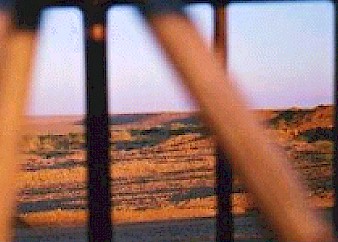
Downhilling II
Further downhilling awaited us, though of a much more manageable variety. Yin wisely opted out of the machine, electing to walk, while Siggi and I pushed on through the rough tracks. Our suspicions that the lakebed was bone dry were confirmed – there was no sight of water at all. We waited for Yin and invited her to take over the driving. Sometimes we jumped in the back; sometimes we got out and pushed depending on the terrain. Once while Siggi was inside and I was out the back, I decided to push the tricycle to get some speed going. Bad idea. As the beast picked up speed, steering became impossible for the driver and the whole thing tipped over onto its side. Yin hit the deck and became a rather bruised and battered Singaporean. Siggi, however, bore the brunt of the damage, being inside the vehicle as he was, with the sharp metal attachments that support the canopy being as dangerous as the impact itself. Shit. We could have come away without a scratch from an uncontrollable situation and yet I could have caused a wholly preventable accident.
I pulled back the canopy to inspect the damage.
“You bastard!” growled the Icelander. Such an outburst was justifiable, but was he hurt? His skeletal system had done a remarkable job of remaining intact, though his skin had been breached. However, at the risk of incurring his wrath for a second time by underreporting the extent of his injuries, he had gotten away with nothing worse than a badly grazed elbow. Which was a disappointment for the Icelandic Amputee Association, but rather refreshing news for Yours Truly. I was unused to my little-boyishness when cycling impacting on others and for the second time in a ten-minute span was glad that we’d averted disaster.
Once we’d dusted ourselves down we carried on more sedately to the lakeshore, if it is indeed possible to refer to a shore of a waterless lake. In any case, the bed itself was white and salty, and I’d read that great fun could be had cycling across salt plains, so directed the trike towards the white granular matter. However, we only got about three metres in before grinding to a halt as it was too muddy to be amenable for cycling. It was amenable, however, for a nice little rest, interrupted only by some artistic photography choreographed by Yin and the wolfing down of the last of our supplies. We contentedly whiled away half an hour or so, thinking how grand it was to be here. It was at this very spot that Granger had pulled his teeth out (his rhinoceros ones, that is) and made the infamous “the stuff is here” comment. It was then left to Doctor Berkey to pull out some bones of his own and add his own historic soundbite: “This means,” began the moustached palaeontologist, “the first dinosaur known in eastern Asia!”1
The Hitchhikers’ Guide to the Gobi
We then began to contemplate our return journey, knowing that we wouldn’t have the time or the inclination to cycle. We had a phone number of someone with a jeep back in the town, but weren’t getting any reception in this natural depression. Thus hitching was the primary option, though we would be hampered by our rather sizeable luggage. A trishaw isn’t just something that can be slung in the back of a saloon. We’d need an empty truck, of which this stretch of track offered few examples. There was some sort of factory in the distance, probably processing rocks, and the intermittent trucks that had passed us earlier had invariably been laden with rubble. There was another ‘highway’ which branched off from ours and seemed to have slightly more traffic (we’re talking five unsuitable vehicles rather than three), and it was decided that we should walk to the confluence point so as to maximise our chances. Suddenly I spied an empty vehicle chugging along in the distance. It was tiny – a three-wheeler in fact – but it was a truck with an empty rear and was capable of accommodating both us and our luggage.
“Guys, that’s our truck!” I declared, pointing into the scrubland. Sighting it and catching it were two different things, and I had to sprint across the sand in a bid to intercept it. Luckily it was a slowpoke, but unluckily its feeble engine’s primary function seemed to be the production of unhealthy sounds which rendered me unable to make the driver hear my yells. When I got to within 100m I started waving my hands frantically and was sure that a combination of his peripheral vision and natural Chinese inquisitiveness would pick me out even if his natural gaze didn’t. However, I continued to go unnoticed and consequently upped my pace so as to be running alongside the truck, barely 10m from the driver himself, and desperately trying to grab his attention. Unbelievably we continued in this vain for a further 50m before he acknowledged my presence and another 25 before he stopped.
It’s not an easy task to breathlessly commandeer a truck in the Gobi and claim a space in it for three foreigners plus a three-wheeler, especially for a non-astronomical sum of money. He failed to be reasonable. Admittedly our bargaining power was somewhat limited, but I wouldn’t bring myself to pay him my entire summer camp salary for making a journey that he was going to undertake anyway, inconveniencing him only to load up the truck. I swore. He went to start the engine of his miserable machine. It wouldn’t start.
He eventually coaxed his engine back into life and chugged away. “You bastard!” I said, but unlike the Icelander, my voice was muffled by a sputtering engine. I walked disconsolately towards my two comrades. We began trudging back towards the confluence point of the two tracks. As we did, low-and-behold there was an empty truck coming our way. The problem being that it was coming our way rather than going our way – the driver in question was heading lakewards. Nevertheless, in our desperate state we started bargaining. He kind of offered that he would take us but would then do a 30km loop, pick up a payload, and drop us somewhere other than the town. All well and good, but we had a date with the owner of our machine which we had to keep to reclaim our collateral. We waved him goodbye.
A motorcyclist was next in line to offer assistance, but other than sending a message to a mate that we were stranded, there wasn’t much he could have done, and I’m sure the mate in question would have seen even more yuan signs than the tricycle owner had done in the morning, and that the motorcyclist himself would have probably wanted a piece of the pie. We waved him on too.
Next we came upon a car pointing in the right direction whose occupants offered to tow us. It was a generous proposal, but our tricycle would have kicked like a mule were it dragged over such uneven ground, damaging both itself and the car in question. That, and the fact that the car was kaput made us decline their offer. This particular area, with a radius of not more than a kilometre, appeared to be a hotspot for breakdowns: the miserly truck driver and this generous driver had followed the trio of tricyclists in coming a cropper. We thanked them and moved on, wondering whether our luck would change. Icelandic stoicism proved the order of the day. The sun was beginning to lose its battle with the darkness that had been so absent during the day. In fact its only refuge had been in our shadows, and it now threatened to swallow us whole.
Sunset in the Desert
At the fork in the road we discovered that the disobliging driver had had a change of heart and was now willing to help his fellow three-wheelers free of charge. We loaded our mean machine into his, and arranged ourselves around it, trying to minimise the chances of bits of metal skewering our limbs every time the truck hit a bump. It was a rough ride. It was a beautiful one too, as the attention-seeking sun opted for a dramatic exit after having beaten down on us all day long. It reddened itself for its plunge below the horizon, and the plastic rainbow that marked the border crossing became silhouetted, as did the hangar-like shed. Between the two a train with more than forty oil tankers was trundling towards Mongolia. I’m an A-to-B man – not one to get overly sentimental about transportation devices (I write whilst doting over my tricycles and Flying Pigeons) – but this tiny train straight out of a toy-set trundling through the Gobi and heading for parts even more remote was wonderfully picturesque and somehow romantic. I tried to share a meaningful look with the Singaporean but it metamorphosed into an unsightly grimace as 40kg of tricycle chose this moment to ram into my left thigh.
“You bastard!” I rather unsportingly directed at our driver for the second time that night, when he was actually playing the part of a Samaritan (albeit a reluctant one). We eventually made it back with all bones intact, but with an assortment of war wounds to nurse and a nice little tale to bore anyone nonsensical enough to listen. Perhaps we should ditch our day jobs and hire ourselves out as Gobi cycling consultants – we’re waiting for your call!
Footnotes
1 New Conquest of Central Asia, Roy Chapman Andrews
2 Twice Around the Word, John Colvin
3 Edge of Blue Heaven, Benedict Allen
Words © Jonathan Litton 2006
Pics © Siau Yin Goh 2006
Stoicism © Sigurdur Gudjonsson 2006
Book alert
The author is currently working on an as yet unnamed book (suggestions on a postcard!) which constitutes a collection of ten Inner Mongolian Adventures. These are all personal experiences, and the provisional list of contents is as follows:
- May Day, May Day! A crash course in Mongolian meteorology
- Mingling with the Mongols – Student life at Inner Mongolia University
- Town of Trade – A report on an Anglo-Russian assimilation project
- High-Voltage Vodka – An Englishman’s take on Inner Mongolia
- On Highways & Highwaymen – Tales of cops, robbers and a little laowai
- Gobi Goat Studies – Transiting between the two Mongolias
- Filming in Lala Land – On being an extra in a TV drama
- Mr. Clever & The Captain – Stories from a summer in the Gobi desert
- The Hitchhikers’ Guide to the Gobi – Three-wheeling through the desert
- A Martyr’s Mission – The life and times of a bullet-dodging border-jumper
Keep yourself updated
The author is currently creating a list of people interested in this project which serves two purposes:
- To keep interested folk informed with updates as to how the project is going and if and when publication might take place; and
- To increase the chances of publication by giving concrete evidence that there is a market out there for such a book
Signing up to the list in no way obligates you to buy the book, and I will not bombard you with rubbish! Anyone interested in adding their name should emailjonathanmarklitton@googlemail.com with “Subscribe Gobi” in the subject line. Anyone wishing to unsubscribe should use the same email address and include the words “Unsubscribe Gobi” in the subject line.
Become a reviewer and gain sneak previews
I am always looking to improve my work and to see how it is received by the readership. However, the nature of writing means that interactions between writer and reader are often rather limited. However, it doesn’t have to be that way! I value constructive criticism immensely and would love to hear any feedback you may have. I am therefore going to positively encourage it with the following offer:
Complete an evaluation of this chapter and receive a sneak preview of a previously unpublished chapter for your efforts (which you are also more than welcome to review!). The format of the evaluation will contain a few basic questions and leave scope for you to write your own views.
The chapters currently available for preview are:
High-Voltage Vodka – An Englishman’s take on Inner Mongolia
On Highways & Highwaymen – Tales of cops, robbers and a little laowai
Gobi Goat Studies – Transiting between the two Mongolias
A Martyr’s Mission – The life and times of a bullet-dodging border-jumper
Read more of my writing in the public domain
Another of the chapters, May Day, May Day! is available in the public domain on the excellent Bike China Adventures website at http://www.bikechina.com/ct-jl-sars03.html. On the same website you can also find further examples of my writing which lie outside the scope of this book. Currently, these are:
Break for the Border – Cycling the Sino-Siberian boundary
On Tracks & Trucks – A broken bike gives me a break from biking

